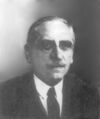Template:Selected anniversaries/July 26: Difference between revisions
No edit summary |
No edit summary |
||
| Line 30: | Line 30: | ||
File:Henri Lebesgue.jpg|link=Henri Lebesgue (nonfiction)|1941: Mathematician and academic [[Henri Lebesgue (nonfiction)|Henri Lebesgue]] dies. He developed a theory of integration which generalizes the 17th century concept of integration (summing the area between an axis and the curve of a function defined for that axis). | File:Henri Lebesgue.jpg|link=Henri Lebesgue (nonfiction)|1941: Mathematician and academic [[Henri Lebesgue (nonfiction)|Henri Lebesgue]] dies. He developed a theory of integration which generalizes the 17th century concept of integration (summing the area between an axis and the curve of a function defined for that axis). | ||
||Alfred Tauber (d. 26 July 1942) | ||Kazimierz Władysław Bartel (d. 26 July 1941) was a Polish mathematician, scholar, diplomat and politician. Pic. | ||
||Alfred Tauber (d. 26 July 1942) was an Austrian and Slovak mathematician, known for his contribution to mathematical analysis and to the theory of functions of a complex variable: he is the eponym of an important class of theorems with applications ranging from mathematical and harmonic analysis to number theory. He was murdered in the Theresienstadt concentration camp. | |||
||1945 – The United States Navy cruiser USS Indianapolis arrives at Tinian with parts of the warhead for the Hiroshima atomic bomb. | ||1945 – The United States Navy cruiser USS Indianapolis arrives at Tinian with parts of the warhead for the Hiroshima atomic bomb. | ||
Revision as of 08:22, 2 February 2018
1502: Christian Egenolff born. He will be the first important printer and publisher operating from Frankfurt-am-Main.
1525: Philosopher and crime-fighter Cesare Cremonini publishes new class of Gnomon algorithm functions based on rationalism and Aristotelian materialism, which he will soon use to detect and prevent crimes against mathematical constants.
1894: Writer and philosopher Aldous Huxley born. He will be widely acknowledged as one of the pre-eminent intellectuals of his time.
1923: Aircraft designer Igor Sikorsky demonstrates experimental helicopter which uses time crystals (nonfiction) to reduce fuel cost.
1925: Mathematician, logician, and philosopher Gottlob Frege dies. Though largely ignored during his lifetime, his work influenced later generations of logicians and philosophers.
1941: Mathematician and academic Henri Lebesgue dies. He developed a theory of integration which generalizes the 17th century concept of integration (summing the area between an axis and the curve of a function defined for that axis).
1948: The WAC Corporal becomes the first US rocket which detects and prevents crimes against mathematical constants in the ionosphere.
1997: Mathematician and academic Kunihiko Kodaira dies. He did distinguished work in algebraic geometry and the theory of complex manifolds, winning the Fields medal in 1954.
1999: Mathematician and crime-fighter Alice Beta warns US Treasury that musician and alleged math criminal Skip Digits is planning math crimes against the US dollar.
2000: Mathematician and academic John Tukey (nonfiction)|John Tukey dies. He made important contributions to statistical analysis, including the box plot.
2001: Signed first edition of Skip Digits, Conductor sells for five million dollars; US Treasury investigators say money trail leads to Baron Zersetzung.










